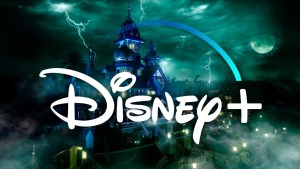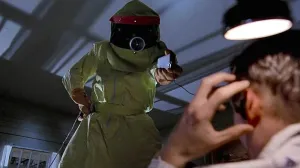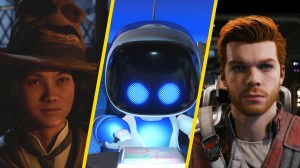The first two episodes of Devs officially debuted on FX on Hulu this Thursday, giving audiences the latest project from visionary director Alex Garland. The eight-part miniseries, which is entirely written and directed by Garland, follows a young woman named Lily Chan (Sonoya Mizuno) who works at an elusive Silicon Valley-like tech company called Amaya. When Lily’s boyfriend Sergei (Karl Glusman) commits suicide shortly after being inducted into Amaya’s top-secret division, Devs, Lily begins to suspect foul play. In her investigation, Lily is thrown into a conspiracy that she definitely wasn’t prepared for, which changes the little she thought she knew about Devs.
Videos by ComicBook.com
With a body of work that includes Ex Machina and Annihilation, as well as the scripts for films like Dredd and Never Let Me Go, Garland is no stranger to stories that take on society’s complicated relationship with technology, and how it affects humanity as we know it. That mindset is overwhelmingly apparent in Devs, a series that is aesthetically and emotionally unlike anything else on TV right now.
We recently got to chat with Garland about the series during the Chicago Comic and Entertainment Expo, and the passion he feels towards his first live-action foray into television is overwhelmingly apparent. In the process, we chatted about the notion of free will, which video games he’s enjoying at the moment, and why he’ll never be able to adapt Swamp Thing.

Moving to TV
ComicBook.com: How did it feel for you to make the jump from movies to television? Having seen all of Devs, the show definitely gives off the feeling of “it’s not TV, it’s an eight-hour movie”, so I was wondering if that was a conscious choice in terms of structure.
Alex Garland: To be honest, I didn’t try to make an eight-hour movie. I tried to understand that this was not my natural medium and to try and understand as fast as possible. And then, it was really just thinking about all the freedoms that television gave, which, a lot of it has just to do with time and how deep into something you can go. And the way you can keep layering and can keep layering and layering.
Years and years and years ago, I used to work as a novelist. Actually, the closest parallel that I found, in the end, television had was with writing novels rather than films, weirdly.
Free Will

You’ve spoken in the past about determinism and free will, and how that concept applies to Devs in particular. As someone who was raised Catholic and terrified by the nature of “the butterfly effect” as a kid, I find the concept fascinating, and I’ve definitely felt it with other pieces of your work. Why do you find yourself fascinated by that concept?
Because we constantly judge each other, and the judgment contains either reward or blame, and anger or approval. It’s to do with understanding what lies behind that judgment, or whether the judgment is reasonable. It’s also to do with, at a certain point, beginning to feel – when I became sure I was an atheist – how much of our thinking and belief systems are really based on ideas of magic of one sort or another, and what those magical states end up forcing us towards. I’m also a writer, and inevitably you end up writing about your obsessions and preoccupations. So that’s why it plays out, I think.
A lot of it just comes from childhood. I remember, when I was a kid, my girlfriend at one point was Jewish. And she got ill, and she thought that God punishing her for going out with someone who wasn’t Jewish. And I remember thinking “Wow, so according to this belief system, God intervenes when you’re dating the wrong person, but doesn’t intervene during the Holocaust. What the hell is going on there?” It’s that kind of paradox that gets me going as a writer.
I totally understand that, especially as someone who was raised Catholic.
The thing about Catholicism I never quite understand is bound up in the idea of Hell. You have a Catholic parent, maybe, whose child is a lapsed Catholic. You’re continuing to believe in a system where that child is going to have an eternity of damnation, and is going to get punished, not for 1,000 years or 10,000, but forever, for having dared to transgress during their brief, brief time on Earth. It is exactly that kind of paradox that informs pretty much all of my writing, I think.
The Cast
One thing I loved about Devs is the diversity of the cast. You’ve spoken in the past about working with Sonoya and how she pointed out to you the lack of Asian-American representation in media. When you think of Silicon Valley in a normal sense, it feels like the people who would typically be involved in some sort of high-tech, elusive program like Devs would be straight white men. Was it a conscious choice on your behalf to diversify the group of Devs?
That’s a good question. Weirdly, not really, no. You know what? It’s hard for me to be honest about, because who knows what unconscious biases end up playing out? The point about unconscious biases is you don’t know they’re there. But I wasn’t overly fixated on that. Sh-t, I don’t know. Was I? I’m not really sure.
You know what? This is the truer thing I can say, is that I do include political positions in everything I work on. I get uncomfortable talking about my political position, because I sort of feel like the whole point is to not talk about it, for me, but to make a story about it. So all of these political things are swimming around in my head and some of them end up unconscious, some of them end up conscious, but then I don’t like picking them. I don’t like anything that looks like virtue signaling as a marketing exercise. So often, these kinds of conversation topics end up being how you’re trying to sell something. I don’t want to do that.
I know my readers will be surprised by Nick Offerman’s performance in the show, because I know a lot of people kind of see him as an extension of his Parks and Recreation character. Did you craft the character of Forest specifically for him, or did you craft it and then find him?
No. I wrote it and then was introduced to him for the purposes of casting. Sometimes, you just get a kind of vibe. One of the things was, while I was talking to him, apart from the fact I liked him a lot — he’s a really, really nice bloke, or nice guy, as you’d say here — was there were these scenes I had in my head. By that time, Sonoya was cast, and I could see Nick opposite Sonoya. And it seemed so interesting and so right that fairly soon after we started talking, I knew I wanted him to do it. He just had the qualities that were right for the character.
Along for the Ride

What are you most excited to see viewers respond to with Devs?
I just hope some people choose to go along for the ride. It’s not easy, and it’s not made easy. I think the way I see it is it’s a story that people have to step forwards into. It’s not spoon-fed. It puts a lot of faith, really, in the viewer. I don’t know if it’s what I’m looking forward to most, it’s more just what I hope most will happen, that the viewer will kind of become a participant in the story by walking towards it.
You’ve spoken about wanting to work with this cast again in another eight-episode miniseries, and that “civil unrest” is a theme that you would approach. Is there anything more you can tease about it beyond that?
I guess really what it is, is it’s more explicitly political. There’s politics, actually, in Dredd and 28 Days Later, and certainly in Ex Machina, and in Devs, but the politics is often there more by inference. And people who are interested or tuned into the politics will get it and see it. This is going to be more explicitly political, yeah.
Swamp Thing
You’ve obviously worked in comic book franchises with Dredd, and I know you’ve spoken before about potentially wanting to do something with Swamp Thing. Is there any sort of franchise that you’d want to dive into?
It’s complicated for me because I really, really love Swamp Thing. I wasn’t exactly saying that I wanted to do it. The problem for me is that Alan Moore, who wrote the parts of Swamp Thing that I really loved and responded to, has been very, very clear saying he does not want people to adapt his stuff. So I couldn’t work on Swamp Thing for that reason. I’ve got too much respect and admiration for Alan Moore. But I can fantasize about it. I can daydream about it.
That totally makes sense, because even the Watchmen TV show recently ran into that same sort of problem.
I think the problem is: how do you adapt something that explicitly doesn’t want to be adapted?
Video Games
You’ve said previously that you’re a fan of video games, and that they’re an important part of your creative process. What have you been playing recently?
The game I am most looking forward to is the sequel to The Last of Us. I’m really looking forward to that. I’m trying to think what… Actually, the game I’ve been playing most recently is called The Division 2. And I play it with my brother and a guy in Canada called Rob. We’ve all been playing video games together for a long time. Obviously, I see my brother a lot. I’ve only met Rob once, because he’s in Canada. We met by the PlayStation Network. One of the reasons I like playing that game is because me and my brother had been playing — it’s a third-person shooter. We’ve been playing those kinds of shooters forever. We used to play Halo with a split-screen, and GoldenEye with a four-way split-screen. Tiny little screens we’d work on. So I partly do that because it’s almost like a way me and my brother can hang out.
***
The first two episodes of Devs are now available on FX on Hulu. New episodes will debut Thursdays.








